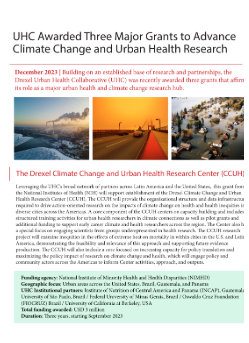Climate and Health Research at the UHC
Researchers at the Urban Health Collaborative are studying the ways climate change affects urban communities, both locally and globally. Our work in this area is supported by multiple agencies, and we are continuously exploring opportunities to expand these efforts.
Table of Contents:
Core Climate Initiatives
Climate projects at the Urban Health Collaborative include the following:
Drexel Research Center on Extreme Weather Events and Urban Health (CCUH)
The Drexel Climate Change and Urban Health Research Center (CCUH) was a P20 Exploratory Center funded by the NIH in June 2023. CCUH focused on action-oriented research into the health impacts of heat and related inequities in cities across the Americas. It established important data, capacity building, and policy translation work that strengthened the UHC's efforts in this area. In summer 2025, the center was renamed the Drexel Research Center on Extreme Weather Events and Urban Health (CCUH) to align with NIH priorities.

Click to learn more about the 3 major grants awarded to the UHC for climate change and urban health research.
SALURBAL-Climate
Climate Change and Urban Health in Latin America (SALURBAL-Climate) examines the impacts of specific climate related exposures, including extreme temperatures, droughts, floods, and air pollution on health and health inequities. The SALURBAL data resource includes urban environment, demographic, and health outcome variables for 371 cities across 11 countries in Latin America. This resource allows the team to study the role of city and neighborhood-level factors in exacerbating or mitigating the health impacts of climate change, and to compare differences both within and between cities across the region.
Heat and Health In Brazilian Cities
Through a partnership with the World Resources Institute (WRI), SALURBAL-Climate is exploring the role of social factors and multiple aspects of the built environment in determining health-related impacts across neighborhoods in Belo Horizonte and Campinas, Brazil. This multi-sector research and community engagement collaboration documents the connections between extreme heat, health, and neighborhood-level characteristics. Findings will support efforts to address these impacts, especially among vulnerable urban residents. Learn more here.
Previous Initiatives
Impacts of Climate-Related Extreme Flood Events
Funded by a Cotswold Foundation Postdoctoral Fellowship, Josiah Kephart examined the impacts of climate-related extreme flood events on health and health disparities in Latin American cities. Learn more here.
Green Spaces, Air Pollution, and Climate-Related Heat Mortality in Latin American Cities
Funded by the Wellcome Trust and led by Daniel Rodriguez at the University of California, Berkeley, this study leveraged SALURBAL mortality data to examine the impact of extreme heat events on urban population mortality, as well as the modifying effect of green space and fine particulate matter. Learn more here.
Opportunities for Research and Action
Across the Urban Health Collaborative, our team is committed to advancing climate and health equity research and to facilitating collaboration with local policy actors and community members. The below lecture was delivered by the UHC’s Co-Director, Ana V. Diez Roux, to the Yale Center on Climate Change and Health:
Additional Resources
UHC Data Portal
The UHC compiles data on health determinants and outcomes for the Philadelphia region. The UHC Data Portal includes frequently requested and readily available datasets covering demographics, health outcomes, environmental hazards, and social, built, and natural environment indicators. Most measures have been aggregated to census tract or ZIP code tabulation area. Explore available datasets, including climate-relevant measures such as greenspace, tree canopy, and air quality, here.
SALURBAL Portal and Data Resource
The SALURBAL data resource is a comprehensive health and exposure dataset that covers 371 Latin American cities. Available metrics span numerous domains, including demographics, health risk factors, climate change-related exposures, mortality, physical and natural environment characteristics, and social and economic environment factors. Explore the SALURBAL Portal and data catalog here.